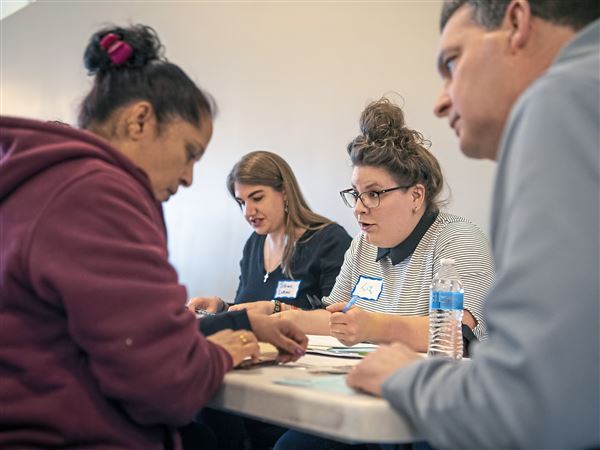How much should older adult patients tell their doctor? What are the essential questions to ask at your next visit?
Neil M. Resnick, chief of geriatrics at UPMC, recommends older adult patients write down the questions they have for their doctor ahead of time, and ask the most important ones first, in case the appointment time runs out.
“It’s very hard to remember them when you’re in the doctor’s office,” he said. “Doctors are squeezed to see patients more quickly….what happens is, patients will get a little nervous. Write it down in advance, prioritize them.” Patients need to work with the doctor as a partner, so don’t delay getting down to business, he said.
“If the doctor knows what’s on your mind, up front, then the doctor can use his or her knowledge to utilize the time best for you.”
When deciding on treatment, let your doctor know how far you want to go, Dr. Resnick said. When you ask about side effects, costs, additional doctor’s visits, let your doctor know what you value, he said.
Being honest might include explaining why you don’t want to take a certain medicine, Dr. Resnick said. “We need to be in an honest partnership where you give us feedback.”
As people get older, he said, the list of conditions and medications can add up. “If you already have nine or 10 diseases and a dozen pills, … if you get another problem, if could be from what you already have, or from a treatment for another illness.”
A new problem that brings you to the doctor could involve mental health, Dr. Resnick said. These include trouble concentrating, trouble remembering, being more short-tempered than usual, feeling sad, having trouble getting out of bed, being bored or crying often.
For older adults, he said, the most common mental health diagnosis is depression, followed by cognitive impairment, either related to depression, Alzheimer’s disease or delirium. Mental health professionals can differentiate what is the problem.
“The delirium state can be brought on by anything,” Dr. Resnick said, it can cause them to appear confused. Although dementia develops over years, he said the onset of delirium occurs in a few days and can be caused by an infection. After treatment, however, he said, recovery from delirium can take awhile.
A new onset of anxiety or depression over the age of 65-70, Dr. Resnick said, often has an underlying medical condition.
Eleven important questions
The following are 11 questions to ask your doctor at your next visit, if you are dealing with a new health concern (adapted from National Institute on Aging’s “Talking with Your Doctor: A Guide for Older People” ):
1. What medical tests do you recommend?
Blood tests, X-rays or other procedures might need to be done to find out what is wrong or to learn more about your medical condition. Some tests, such as Pap tests, mammograms, glaucoma tests and screenings for prostate and colorectal cancer, are done regularly to check for hidden medical problems.
2. Why is the test important, how should I get ready for it and what will it cost?
You can find information about medical tests online at the National Library of Medicine’s MedlinePlus website (medlineplus.gov).
3. When will I know the results of the test?
Make sure the doctor tells you what the results mean. You may want a written copy; if the test is done by a specialist, have the results sent to your primary doctor.
4. What is my diagnosis and what can I expect?
Ask the doctor to tell you the name of the condition and why he or she thinks you have it.
5. How will my condition be treated or managed?
You will want to know how it will affect you and how long it might last. Some medical problems never go away completely.
6. Why do I need this new medication and are there special instructions or possible side effects?
Ask your doctor/pharmacist to explain anything confusing about your prescription, and keep a record of all your medicines and instructions for taking them.
7. Are there foods or drinks I should avoid while I’m on the medicine?
You may have to take the medicine with food or a whole glass of water.
8. What are my choices for other treatments?
There are different ways to manage many health conditions, especially chronic conditions like high blood pressure and cholesterol. If cost is a concern, ask the doctor if less expensive choices are available.
9. What are the pros and cons of my treatment alternatives?
Find out what side effects might occur, how long the treatment would continue, and how likely it is that the treatment will work for you. Consider its impact on your overall life.
10. What can I do to prevent disease and be my healthiest?
It’s never too late to stop smoking, improve your diet or start exercising. Get regular checkups and see other health professionals, such as dentists and eye specialists to promote good health. Even people who have chronic diseases, like arthritis or diabetes, can prevent further disability and, in some cases, control the progress of the disease.
11. Will exercise help me?
Exercise has been shown to give older adults more energy, help maintain fitness, improve mood, improve balance and help manage and prevent diseases like heart disease, diabetes, some types of cancer, the brittle bone disease of osteoporosis and disabilities.
Your doctor can recommend specific kinds of exercise for you. For ideas, suggestions for older adults can be found in Go4Life, developed by the National Institute on Aging: www.nia.nih.gov/Go4Life or call 1-800-222-2225.
Jill Daly: jdaly@post-gazette.com, 412-263-1596.
First Published: October 27, 2017, 12:00 p.m.


















